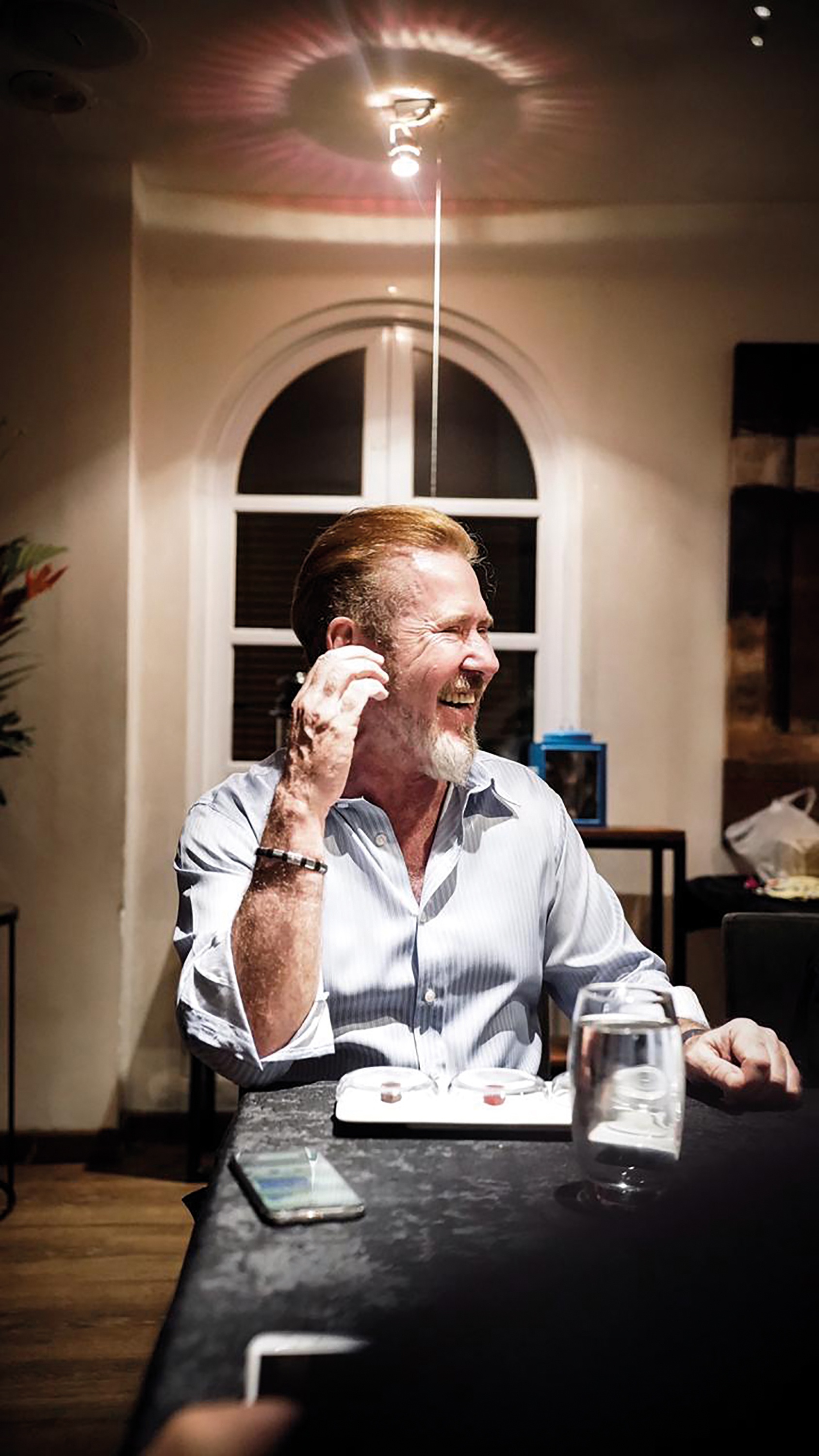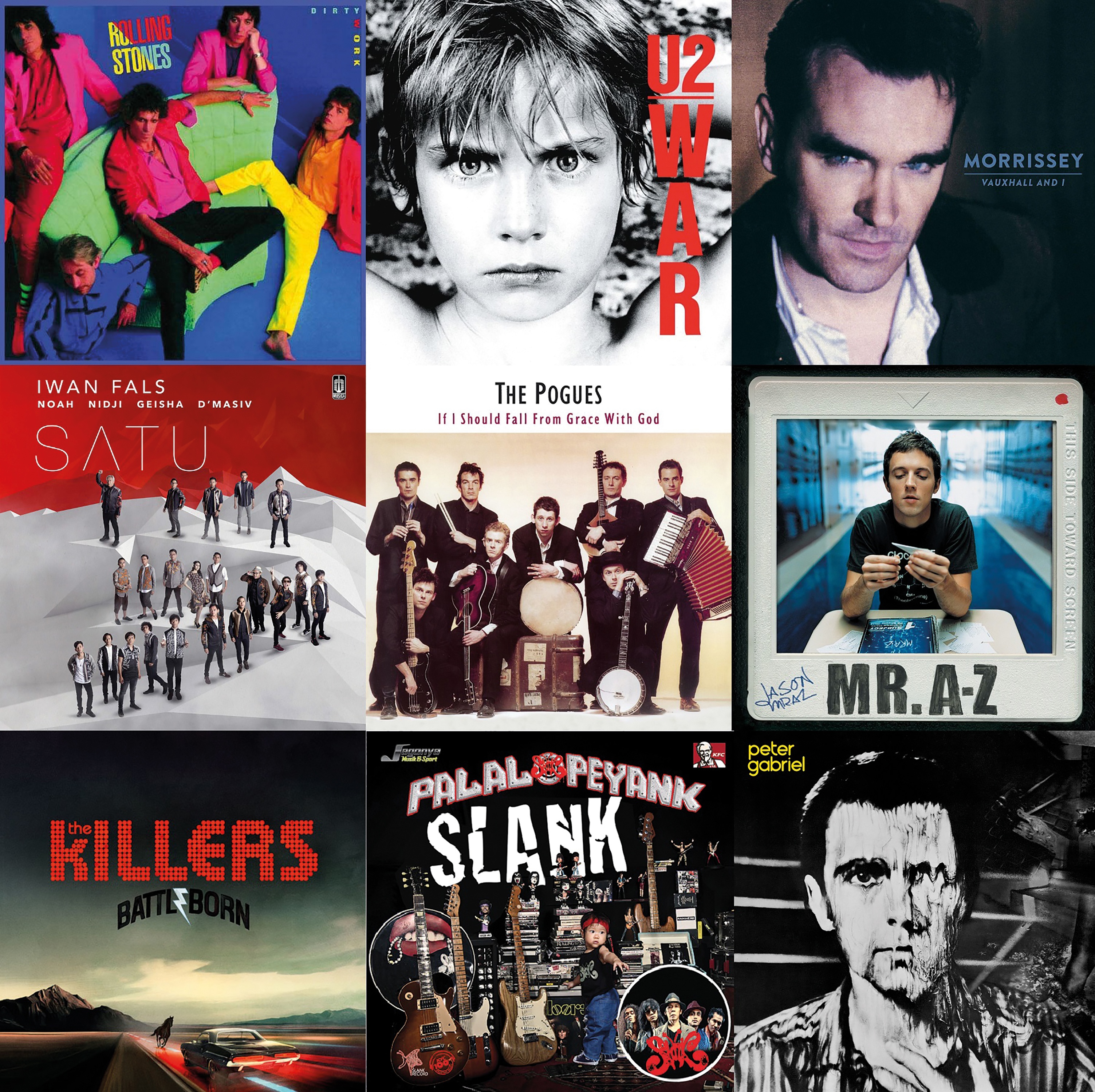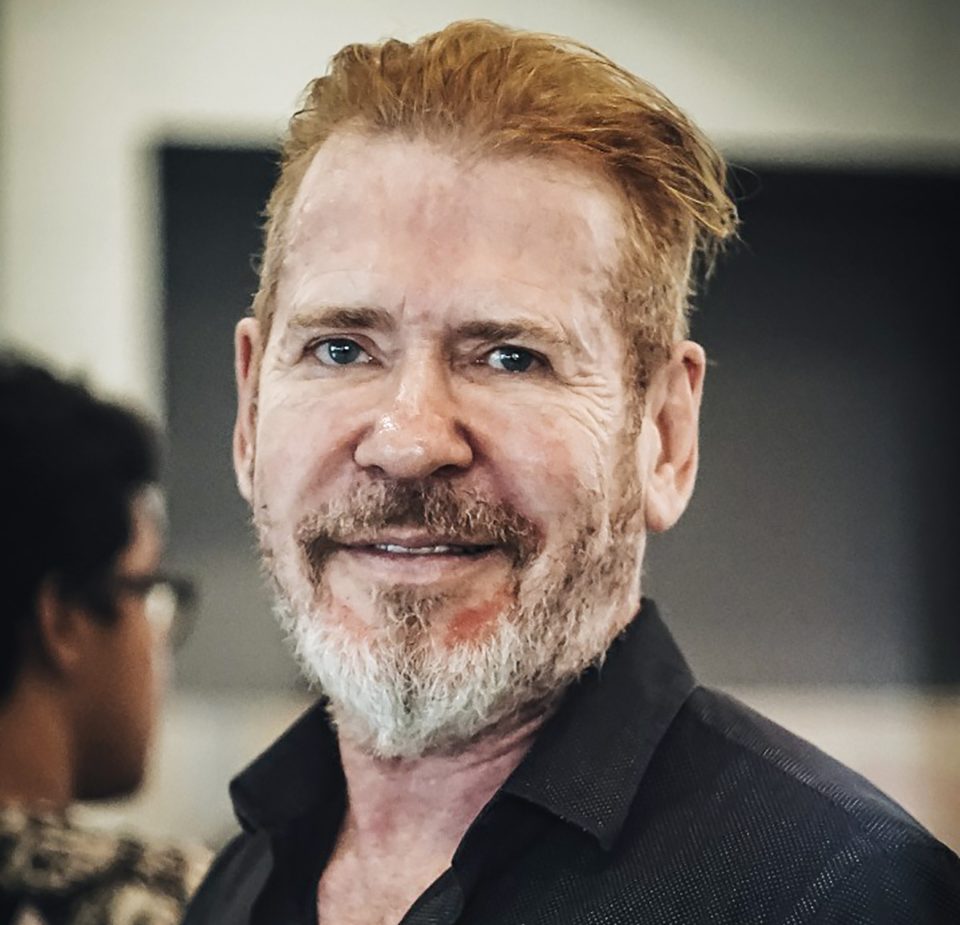Meet Steve Lillywhite, the producer of U2, the Rolling Stones, Morrissey and dozens of other top-selling artists.
In recent years, Steve Lillywhite has made KFC the biggest music chain in Indonesia. Indonesia Expat sat down with Steve and discovered this Englishman is one of the nicest people on the planet.
You spent decades in the UK and the US, producing some of the biggest bands in the world. How did you end up in Indonesia?
I had this thing that Asia was calling me, but I had no idea which part of Asia. I first went to Singapore to speak at a music conference. Singapore reminded me of Disneyland. It was great for three days, but would I want to live there? No. Where was the seedy underbelly? So I was a bit disappointed with Singapore. Now, of course, I enjoy my trips there. I also went to Korea and other places in Asia. I first came to Jakarta in late 2014, when Ariel, the lead singer of Noah [formerly Peterpan] asked me to produce some songs for their album Second Chance. I was sitting in Jakarta one day, it was pissing down with rain, I’m eating gado-gado with my fingers, with Ariel, and seeing people opening CDs and devouring the contents. And I decided: I’m going to stay here.
How did your job with KFC come about, bundling CDs with fried chicken?
On New Year’s Eve in 2015, I bumped into Sandhy Sondoro, the Indonesian singer, and he said we must get together. Then he texted me and asked me to meet a friend of his called Once Mekel, who’s the former lead singer of the legendary band Dewa 19. So I met Once, who was working at KFC doing the CDs, and they needed someone to help run the company. I came in and met [KFC Indonesia boss] Ricardo Gelael at his office on Jalan Palatehan in Blok M. He offered me the job and I was working there by February 2016. It was incredible.
CDs are declining in the West. How many are you selling in Indonesia?
Our numbers are off the charts. It was 500,000 a month earlier this year. Then in April, we sold about 700,000. Our biggest seller for April was the soundtrack from Dilan 1990-1991. The movie has gone, but the soundtrack is still selling. We’re doing so well because we have a great relationship with the artists and we care about making good music.
Many people now listen to music via USB sticks. Have you considered using that format?
We were looking at releasing albums on USB but we didn’t go further because the price of the hardware is so much higher than a CD and it varies ridiculously. That’s because they don’t make USBs in Indonesia; they’re all imported, so the price depends on the rupiah’s exchange rate. For the future, we are looking at a streaming service.
What do you think of the production quality of Indonesian music?
It’s variable. I’ve always said: I’ve made the best records in the worst studios and the worst records in the best studios. You can’t blame the equipment. You can only blame the attitude and the inexperience.
You produced an album for Iwan Fals, who is often labelled as “the Bob Dylan of Indonesia”. Is that a fair description?
For me, Iwan Fals is better than Bob Dylan. We have no equivalent to Iwan Fals in the West, because Iwan Fals is cool to 60 year olds and he’s cool to 16 year olds. Bruce Springsteen, 16 year olds don’t care; Bob Dylan, 16 year olds don’t care. But Iwan Fals is still cool.
If you had a magic wand, what would you change about Indonesia, apart from the traffic?
Cigarette smoking. I would convince people that smoking is not a choice; it’s an addiction and it’s a pointless one. People look at it as a choice and something that they’re proud of doing. It’s a con by big multinational corporations to make them rich. You look at poor people smoking and you might think maybe it’s the only bit of pleasure they’ve got in their lives, but there’s only one thing it does, and that makes you want to have another cigarette.
Speaking of addictions, what do you think of modern, mass-produced music that’s engineered to be addictive, where many artists don’t write their own songs or play instruments?
I don’t know if it’s a good thing or a bad thing. But there is one absolute certainty in the world of art, and especially in music, and that is that the technology leads the art form. You can go all the way back to the 1950s when drummers were playing very, very quietly. Why? Because the technology was acoustic instruments. So drummers had to play quietly. Then the technology changed to electric guitars, which changed the art form, because drummers had to start playing louder. At the moment, music technology is all “in the box”, which is Pro Tools [music software] done on a laptop. So the modern sound reflects the technology of Pro Tools.
Are you bugged by this evolution of popular music?
It is what it is. Technology has led the art. You can argue that two guitars, a bass and drums has almost lasted its course. If I ever a go to a club or a gig now and I see two guitars, a bass and drums I go, “Oh no!” Because I know exactly what it’s going to sound like. I think we all need something new to fire up our synapses. Though I do like the Arctic Monkeys, who I think really do try hard to do something new, and I don’t think they hit it every time, but [their frontman] Alex Turner is a great lyric writer. Their last album was very weird though, and to me, it sounds too much like David Bowie.
Surely that isn’t a bad thing?
It is a bad thing, when anyone sounds too much like another artist. When I started out in the late 70s and the early 80s, if you were making music and it sounded like someone else’s song, you’d say, “No, no, no, we can’t use that.” Nowadays though, it’s reference, reference, reference; it’s not even sampling. It’s because the technology allows you to access any song that’s ever been made, at the touch of a button. But I didn’t reference other people’s music.
It’s a producer’s nightmare when the drummer comes into the studio and gives you a record and says, “I want the drums to sound like that.”
You’ve been credited with co-creating the “gated reverb” big drum sound of the 80s. Was that sound criticized at the time? Like today’s criticism of the prevalence of AutoTune and the millennial whoop?
No, not at the time. It was considered high art because it was difficult to get and it was something new. It only became annoying when it became part of a program on a computer and anyone could do it. It was used on top of music that didn’t need that sort of a sound.
How do you feel about claims that today’s biggest producers, such as Max Martin and Dr Luke, are using digital templates to create sound-alike hits?
My opinion is that they’re just taking the current technology and applying it. But I didn’t get into the music business to be a typist. Nowadays, you have to be able to look at the screen. And although I know what everything does, I never look at the screen. I always use my ears. In the 80s, I put my big drum sound on things, but then I learned that I should not go in with a preconceived idea of putting my sound onto artists. Instead, I should analyze what they’re doing and how I can use my experience to make things better.
YouTube’s 100 most viewed songs are dominated by Western and Latin American artists. Do you think an Indonesian artist could ever get a song in that top 100?
Every time an Indonesian artist wants to make it abroad, they’ve gone about it the wrong way. They’ve tried to sound like something Western. And I’ve been all around the world, worked with lots of people from different cultures and they all say to me, “How do we get our music liked by Westerners?” Well, don’t look at it like that. Instead of trying to sound like Western music, look at what outside music has become successful: Spanish, Latin. What do we have in Indonesia that is closest to that? Dangdut. Not the old dangdut, but the modern dangdut: artists like Via Vallen, Siti Badriah. And use the technology. The reason that dangdut is so big here and that rock music is dead, is that dangdut really suits the latest technology. Siti Badriah’s song Lagi Syantik has over 500 million YouTube views because she’s getting views from outside the country. By sticking to their roots, someone in Indonesia will make it big outside.
One the most famous tracks you ever produced was Fairytale of New York, which has become Britain’s favourite Christmas song. Do you still get a share of the royalties?
I do. Up until about 15 years ago, I thought I was made for life, because I didn’t see streaming. I just saw expensive CDs. And I made timeless albums. Then of course, downloads came and a pound became five pence, and then streaming came and five pence became 0.1 of a penny. But I’ve done very well. I still get some royalty cheques, but nothing like the halcyon days of $15 CDs.
How did you get into producing?
I started out at 15, pushing buttons in a studio in London in the 1970s. Punk rock was a wave that was full of bands that couldn’t really play, so I was sort of a producer that couldn’t really produce. But I rode that wave and I got a hit with Siouxsie and the Banshees. And before that, I’d worked with Johnny Thunders, who was in The New York Dolls. And the moment I got that hit, I could then choose who I wanted to work with. By the time I was 23, I was working with U2, and they’d not yet had any hits, so no one knew who they were. But there was something about them that I thought was amazing.
Tell us about the producer’s role.
The definition of a producer is someone who takes responsibility for the quality of the record at the end of the day. Some producers sit at the back and read a book, or just come to the studio once a week, telling you what they don’t like and then leaving. At the other end of the scale, you’ve got someone like Mutt Lang, who can literally play every instrument better than every member of the band, probably writes half the song for you and will stay there for days, getting one little thing right. I’m halfway between the two. I’m definitely the alpha male in the studio, but I can just chat and make people feel at home.
In Indonesia, you were a judge on the Just Duets talent show on Net TV in 2016. Back in 2010, there was talk that you might replace Simon Cowell on American Idol. Are you too nice to be a judge?
No! On Net TV, I was the only one of the judges who got booed. Because I was honest. For American Idol, I got very, very close. I was called back two or three times to meet the higher and higher up people; but after Simon Cowell left, they decided to change the style of the judges and went with Steven Tyler and Jennifer Lopez, instead of going for another industry person. They said though, that if they were going for another industry person, I would’ve been the guy.
You seem like a natural for that sort of role.
Yeah, I’m pretty shallow [laughs]! Would I have been happy doing the same sort of packaged thing, week after week? I don’t know. I’m sort of glad I didn’t get it. I mean, financially, it would have been amazing, but I think I’m still thought of as cool by a certain demographic because I’ve never really sold out. I’ve never entered that world of making an instant pop star and that’s mainly because I love artists who have creativity and at least some ownership of their career.
What are your current ambitions?
If I could do it, I would like to put Jakarta on the map as a destination for musicals. And not imported musicals, but local musicals for Indonesians. I’m not about taking my culture and importing it to Indonesia. I am about taking their culture and helping them grow their business. At the moment, Jakarta is not a tourist destination with something big on the map. New York has Broadway, London has the West End. Now, I’m not saying we can build something as big as that, but love of music in this country is so incredible, that we could have something like musical theatre in the way of We Will Rock You or Mamma Mia. You could do it, for example, with the life story of Iwan Fals as a musical set to his songs. It’s a story of redemption, it’s a story of sadness, it has everything.
Who’s the most genuinely talented artist you’ve ever worked with?
I would say it’s Lee Mavers, the lead singer of The La’s. They had the hit single There She Goes on their 1990 debut album, which I produced. Lee was absolutely incredibly talented but he was unhappy with the album. You have to believe in your songs enough and you have to let it go, whereas he kept wanting to redo the album. He’s never made another album.
Who are some of the most unique stars you’ve worked with?
The biggest underachiever: Shane MacGowan of The Pogues. The biggest overachiever: Bono. The most fearless: Morrissey. The most bohemian people I’ve ever worked with are Shane MacGowan and Keith Richards. These are people who don’t care if they get up at 8 o’clock in the morning or 8 o’clock at night or at 3 in the morning, it’s purely coincidental. Working with Shane was great if you got him when he was up. The problem was, you didn’t know when he’d be up. But The Pogues were great. It was really fun working with them.
Were you surprised by Morrissey’s fan base in Indonesia? Have you stayed in the Jakarta hotel named after him?
No, I haven’t! I produced three albums for Morrissey. I’m proudest of the first one, Vauxhall and I. I recently did a question and answer session for that album’s 25th anniversary for Morrissey fans in Jakarta. One of the guys there had Now My Heart is Full and a picture of Morrissey’s face tattooed on his arm. And everyone ended up singing along to that song. It was the most random thing, that 25 years after making this album that was so English, in such an English setting, that here I am in Jakarta with people who are so moved by it.
Apart from the people and the music, what’s the best thing about Indonesia?
Gado-gado, rendang and my fiancée, Susi’s, cooking. She’s a great cook.




